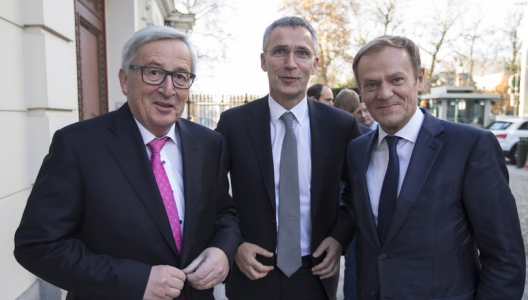 Rising from the ashes of World War II, NATO and what is now the European Union were created with one goal: to prevent the horrors of another war in Europe….
Rising from the ashes of World War II, NATO and what is now the European Union were created with one goal: to prevent the horrors of another war in Europe….
We are different but complementary. NATO, a unique alliance between Europe and North America, has been the cornerstone of our security. It is this security that has enabled the European Union to deliver peace, prosperity and political cooperation for the continent. We have replaced trenches with negotiating tables.
But more than ever in a changing world, soft power alone is not enough….
The challenges confronting us are severe and complex: terrorism stemming from turmoil in North Africa and the Middle East, a Russia willing to break international law, the refugee and migration crisis, and cyber-attacks. These are urgent concerns requiring us to work not just side-by-side, but hand-in-hand….
When it comes to hybrid attacks, for example, we have agreed to pull together if one of us is threatened – to increase the resilience of our societies, to share our understanding of what is happening on the ground, and to combat and dispel propaganda.
On cyber defence, we are sharing information and strengthening cooperation on training. That’s important because in a deeply-integrated economy like Europe’s, an attack on one country hurts its neighbours too.
Building on our achievements in countering piracy off the Horn of Africa, we are increasingly working together to cut the lines of human smuggling in the Mediterranean. We are using exercises to learn from one another – including in planning, and sharing the lessons we have learned, to destroy the business model of those wilfully exploiting the misery of refugees.
But our security so often depends on stability beyond our borders. That is why we are working with countries like Jordan, Tunisia, Morocco, as well as Georgia, Moldova and Ukraine, and in the Western Balkans – helping them to strengthen their institutions and sustain their reforms. This cooperation with NATO is a key strand of the EU’s Global Strategy to build bridges with partners around the world and protect citizens at home.
Put simply, all of this means we are becoming better prepared to deal with clear and present dangers as well as an uncertain future.
Excerpts from joint op-ed by President of the European Council Donald Tusk, President of the European Commission Jean-Claude Juncker, and NATO Secretary General Jens Stoltenberg.
Image: President of the European Commission Jean-Claude Juncker, NATO Secretary General Jens Stoltenberg, and President of the European Council Donald Tusk, Dec. 13, 2016 (photo: NATO)
